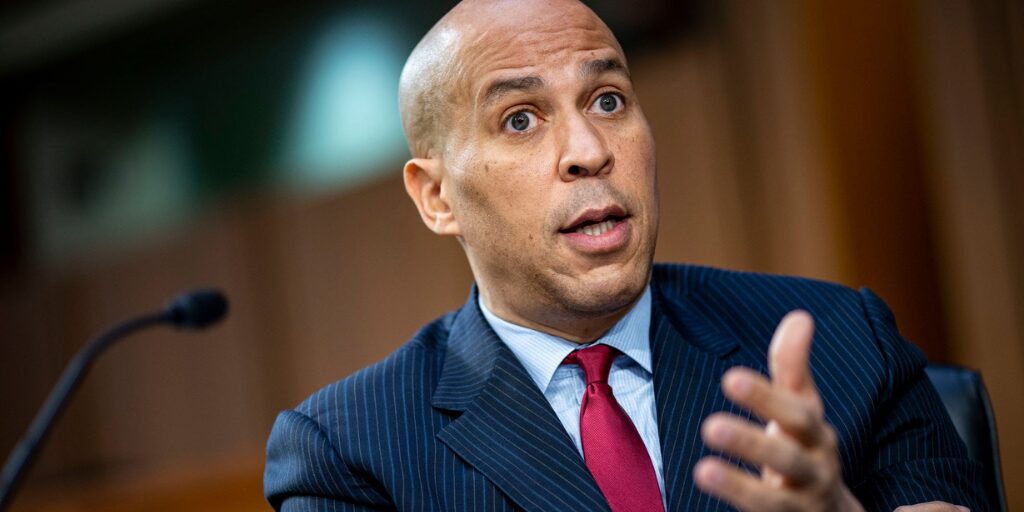Cory Booker made headlines recently for delivering a marathon speech that lasted over 25 hours, breaking a long-standing Senate record. This remarkable feat was not just about the duration; it was also a passionate protest against certain policies of the Trump administration. As we explore whether Cory Booker broke the longest filibuster record, it’s essential to consider the context, reactions, and implications of his historic address.
Key Takeaways
-
Cory Booker’s speech lasted 25 hours and 4 minutes, breaking the previous record held by Strom Thurmond.
-
His speech was a response to urgent political issues, aiming to rally support against the Trump administration’s policies.
-
Booker utilized a unique strategy, allowing fellow senators to ask questions while he maintained the floor.
-
The speech received massive media attention, garnering millions of views on social media platforms.
-
Booker’s achievement highlights the evolving nature of filibusters and their role in modern politics.
Cory Booker’s Historic Speech
Overview of the Speech
Cory Booker’s speech on the Senate floor was a truly remarkable event. It wasn’t just about talking for a long time; it was about making a statement. He took to the podium on Monday at 7 p.m. and continued until after 8 p.m. on Tuesday, surpassing a record that had stood for decades. The speech was a protest against certain policies, and it clearly resonated with many people. It’s worth noting that healthcare access is a key issue that Booker has consistently addressed in his political career.
Significance of the Event
This wasn’t just another day in the Senate. Booker’s speech broke a 68-year-old record, previously held by Strom Thurmond. The contrast between the two speeches is stark, with Thurmond’s being in opposition to civil rights and Booker’s advocating for what he believes in. The speech garnered significant attention, with millions viewing it across various platforms. It definitely sparked a national conversation.
Here’s a quick look at the numbers:
-
Record broken: Longest Senate speech
-
Previous record holder: Strom Thurmond (24 hours, 18 minutes)
-
Booker’s speech length: 25 hours, 4 minutes
Emotional Moments During the Speech
There were several moments during the speech that really stood out. Booker himself became emotional, wiping away tears at times. Fellow senators showed their support, with many offering words of encouragement and appreciation. The atmosphere in the Senate chamber was charged, and the conclusion of the speech was met with cheers and hugs. It was clear that this was more than just a political act; it was a deeply personal one.
It’s hard to ignore the emotional impact of Booker’s speech. The raw emotion he displayed connected with viewers and underscored the passion behind his words. It wasn’t just about policy; it was about people and the issues that affect their lives.
Breaking the Longest Filibuster Record
Previous Record Holders
Before Cory Booker’s lengthy address, several senators held the title for the longest filibuster. Strom Thurmond’s 1957 filibuster, clocking in at over 24 hours, stood as a significant benchmark for many years. Wayne Morse also held a record with a 22 hour filibuster. These speeches weren’t just about duration; they were about making a statement.
Comparison with Other Filibusters
When you stack Booker’s speech against others, a few things stand out. Ted Cruz once spoke for 21 hours, and Rand Paul had a pretty long one too. Chris Murphy did a 15-hour speech. Booker’s speech surpassed these.
The Context of Booker’s Speech
Political Climate at the Time
Booker’s speech happened during a tense period. There was a lot of political division. It felt like things were constantly changing. The country was really split on many issues. People were looking for someone to take a stand, to really speak up about what was going on. It was a time of high emotions and strong opinions, making Booker’s actions all the more noticeable.
Key Issues Addressed
Booker didn’t hold back. He talked about everything from healthcare to Social Security. He even brought up immigration and the economy. It was a wide range of topics, all connected to how he saw the current administration affecting everyday people. He wanted to show how these issues were impacting real lives, not just abstract political ideas. He also touched on public education, free speech, and foreign policy. It was a comprehensive overview of his concerns.
Public Response to the Speech
People definitely had opinions about Booker’s speech. Some thought it was inspiring, a real show of commitment. Others weren’t so sure, questioning his motives or the effectiveness of the approach. Social media was buzzing, that’s for sure. It sparked a lot of conversations, both good and bad. It got people talking, and that’s something, right?
It’s hard to measure the exact impact, but it’s safe to say that Booker’s speech left a mark. Whether people agreed with him or not, they were paying attention. It became a moment that people would remember and discuss for a while.
Reactions from Fellow Senators
Support from Democratic Colleagues
It’s no surprise that Cory Booker’s speech garnered significant support from his Democratic colleagues. Many took to the Senate floor to participate, asking questions and offering encouragement throughout the lengthy address. This support wasn’t just verbal; it was a strategic move to allow Booker to elaborate on key issues and maintain his position without losing the floor.
-
Senators like Chris Murphy and Andy Kim actively engaged in the proceedings.
-
They used questions to highlight various topics, from Medicaid to national security.
-
Their participation transformed the speech into more of an exchange, keeping the focus sharp.
The unified front displayed by the Democratic caucus underscored their commitment to the issues Booker raised and their admiration for his endurance. It was a clear demonstration of solidarity within the party.
Comments from Republican Senators
While direct public statements from Republican senators regarding Booker’s speech were somewhat limited, the general sentiment appeared to be one of acknowledgement, if not agreement. It’s worth noting that the political climate at the time was particularly charged, making bipartisan praise less common. However, the lack of outright condemnation from across the aisle could be interpreted as a tacit recognition of the importance of the issues Booker addressed.
Public Statements Following the Speech
Following Booker’s speech, a wave of public statements flooded social media and news outlets. Democratic senators were quick to praise his dedication and the substance of his message. Many highlighted the historical significance of his actions, particularly in light of previous filibusters with less noble intentions.
Here’s a glimpse of the reactions:
-
Numerous senators posted on social media, commending Booker’s stamina and commitment.
-
Some emphasized the importance of the issues he brought to the forefront.
-
Others drew attention to the contrast between Booker’s speech and past filibusters, like Strom Thurmond’s.
|
Senator |
Statement Highlights |
|---|---|
|
Chuck Schumer |
“Do you know how proud this caucus is of you? Do you know how proud America is of you?” |
|
Chris Murphy |
Noted Booker’s interesting tactic of having his chair removed to avoid sitting. |
The Mechanics of a Filibuster
Rules Governing Senate Speeches
The Senate operates under a unique set of rules, especially when it comes to debate. A filibuster is essentially a prolonged speech, or series of speeches, used to delay or block a vote on a bill or other measure. Unless there are specific limits in place, a senator recognized by the presiding officer can speak for as long as they want. They generally can’t be forced to stop or even be interrupted without their permission. However, there are some requirements. The senator must remain standing and speak continuously. This becomes increasingly difficult as time passes. One interesting tactic is to have a Senate page remove the senator’s chair to eliminate the temptation to sit down. Senators can yield for questions without losing the floor, but they must remain standing while others are talking. These rules shape the dynamics of Senate debates and can significantly impact the legislative process. Understanding these rules is key to understanding informed choices voters make.
Historical Use of Filibusters
Filibusters have a long and colorful history in the Senate. They’ve been used for various reasons, from blocking civil rights legislation to protesting presidential nominations. Some notable examples include:
-
Strom Thurmond’s 24-hour, 18-minute filibuster against the Civil Rights Act of 1957.
-
Ted Cruz’s 21-hour, 19-minute speech advocating for defunding the Affordable Care Act in 2013.
-
Rand Paul’s filibuster of John Brennan’s CIA nomination.
Filibusters are not always about blocking legislation entirely. Sometimes, they’re used to raise awareness about an issue, force negotiations, or simply make a political statement. The effectiveness of a filibuster often depends on the political climate and the senator’s ability to maintain stamina and public attention.
Differences Between Filibuster and Extended Speech
While both involve long periods of speaking, there are key differences between a filibuster and a regular extended speech. A filibuster is specifically aimed at delaying or blocking a vote. An extended speech might be for educational purposes, to highlight an issue, or to express a viewpoint without the explicit goal of obstruction. Here’s a table summarizing the key differences:
|
Feature |
Filibuster |
Extended Speech |
|---|---|---|
|
Primary Goal |
Delay or block a vote |
Educate, highlight, or express a viewpoint |
|
Strategic Intent |
Obstructive |
Informative or persuasive |
|
Senate Rules |
Subject to specific rules and precedents |
Governed by general debate rules |
|
Public Impact |
Often generates significant media attention |
May receive less widespread attention |
It’s important to note that not all long speeches qualify as filibusters. For example, Cory Booker’s speech, while lengthy, wasn’t technically a filibuster because he wasn’t trying to block a specific bill or nominee. Understanding the nuances between these types of speeches is crucial for interpreting Senate proceedings.
Booker’s Preparation and Strategy
Physical and Mental Preparation
Okay, so you don’t just wake up one morning and decide to talk for hours on end. It takes some serious prep! I imagine Cory Booker had to get his body and mind ready for the endurance test. Think of it like training for a marathon, but instead of running, you’re talking. Hydration is key, I’m sure. And probably a lot of mental pep talks.
Tactics Used During the Speech
Booker used some interesting tactics to keep going. One thing I read was that he had a Senate page take away his chair! That’s dedication. He also let other Democratic senators ask him questions. This is a smart move because it lets him take a tiny break while still holding the floor. It turns the speech into more of a conversation, which probably helps keep him (and the audience) engaged.
Role of Fellow Senators
It wasn’t just Booker up there talking to himself. He had a whole crew of Democratic senators backing him up. They jumped in with questions and comments, which gave Booker a chance to elaborate on different points. It sounds like they were trying to make it less of a solo act and more of a team effort. This support was likely crucial for maintaining momentum and keeping the speech focused.
It’s easy to forget that these kinds of events aren’t just about one person. There’s a whole team working behind the scenes, offering support and keeping things running smoothly. From the staff who stayed up all night to the senators who participated, it’s a group effort.
Media Coverage and Public Engagement
Social Media Reactions
Social media went wild during and after Cory Booker’s speech. It was interesting to see how quickly opinions spread. You had people live-tweeting every moment, sharing clips on Facebook, and even creating TikToks about it. The sheer volume of posts was pretty intense. It felt like everyone had something to say, whether they agreed with Booker or not.
Television and Online Viewership
Booker’s speech drew a huge audience, both on TV and online. News channels covered it live, and many people streamed it on platforms like YouTube. The numbers were impressive, especially considering how long he spoke. It’s clear that people were interested in what he had to say, even if they didn’t watch the whole thing. According to reports, his speech had eclipsed 350 million likes on TikTok live, and more than 115,000 people were watching his office’s livestream on YouTube.
Impact on Public Opinion
Did Booker’s speech change minds? That’s the big question. It’s hard to say for sure, but it definitely got people talking. Some polls showed a slight shift in public opinion on the issues he addressed, but it’s tough to know if that was directly because of the speech. What’s undeniable is that he raised awareness and got his message out there. It’ll be interesting to see if it has any lasting effects on beautiful parks and the political landscape.
It’s important to remember that media coverage can shape how people perceive events. The way news outlets frame a story can influence public opinion, so it’s always good to get information from different sources and think critically about what you’re seeing and hearing.
Here are some ways the media covered the event:
-
Live broadcasts on major news networks
-
Extensive coverage on news websites
-
Analysis and commentary from political pundits
-
Social media updates and reactions
Historical Significance of the Record
Implications for Future Filibusters
Cory Booker’s lengthy speech, while not technically a filibuster, has definitely stirred up conversations about the future of such tactics in the Senate. It makes you wonder if we’ll see more senators attempting similar feats, pushing the boundaries of what’s considered a traditional filibuster. It’s possible that Booker’s actions could inspire others to use extended speeches as a way to draw attention to specific issues, even if it doesn’t strictly adhere to the classic filibuster rules. Will this lead to changes in Senate procedure? Only time will tell, but it’s certainly something to keep an eye on.
Cory Booker’s Legacy
Booker’s speech will likely be remembered as a defining moment in his political career. Whether you agree with his views or not, you can’t deny the dedication and stamina he showed. This event has solidified his image as a passionate and vocal advocate for his beliefs. It’s the kind of thing that sticks with you, and it could have a lasting impact on how people perceive him as a leader. He’s definitely left his mark on the Senate record books, and it’ll be interesting to see how this shapes his future endeavors.
Comparison with Civil Rights Movement
It’s hard not to draw parallels between Booker’s actions and the tactics used during the Civil Rights Movement. While the issues are different, the underlying principle of using prolonged speeches and demonstrations to raise awareness and force change is similar. Think about the sit-ins and marches of the past – they were all about making a statement and disrupting the status quo. Booker’s speech, in a way, echoes that spirit. It’s a reminder that sometimes, you have to go to extreme lengths to get your voice heard. The Turkish Consulate’s new tower controversy highlights the importance of ethical considerations in political actions.
It’s important to remember the historical context of filibusters. They’ve been used for both noble and less noble causes throughout history. Booker himself acknowledged the irony of potentially breaking a record previously held by someone who used the filibuster to obstruct civil rights legislation. This adds another layer of complexity to the discussion and forces us to consider the motivations behind these types of actions.
Here are some key differences between Booker’s speech and historical civil rights actions:
-
Booker’s speech was focused on contemporary political issues.
-
Civil rights actions often involved mass participation and direct confrontation.
-
The historical context and societal impact of each are vastly different.
Personal Reflections from Cory Booker
Booker’s Thoughts Post-Speech
After the historic speech, Cory Booker expressed a mix of exhaustion and fulfillment. He emphasized that the act wasn’t about breaking records, but about amplifying the voices of those often unheard. The senator reflected on the emotional toll of the speech, noting the physical and mental endurance required. He also spoke about the outpouring of support he received from constituents and colleagues alike. It was a moment of profound connection, reinforcing his commitment to public service.
Impact on His Political Career
Booker’s filibuster undoubtedly left a mark on his political trajectory. It solidified his image as a passionate and unwavering advocate for social justice. The speech garnered national attention, boosting his profile and sparking conversations about the issues he championed. While some critics questioned the effectiveness of the tactic, it undeniably showcased his dedication and willingness to fight for his beliefs. This event could influence his future endeavors, potentially shaping his role within the Senate and beyond. The Senate record is now his.
Messages to His Constituents
Booker’s message to his constituents following the speech was one of hope and continued action. He urged them to remain engaged in the political process, emphasizing that change requires sustained effort and collective action. He highlighted the importance of holding elected officials accountable and advocating for policies that promote equality and opportunity for all. He wanted to address housing issues. He also shared a few key points:
-
Stay informed about the issues affecting your community.
-
Contact your representatives and make your voice heard.
-
Support organizations working to advance social justice.
The senator stressed that the fight for a more just and equitable society is far from over, and that it requires the ongoing commitment of every citizen. He encouraged his constituents to never lose sight of their shared values and to continue working together to build a better future for all.
The Role of Emotional Appeal in Politics
Booker’s Use of Personal Stories
Politicians often use personal stories to connect with voters, and Cory Booker is no exception. He skillfully weaves narratives into his speeches to make complex issues more relatable. These stories can humanize policy debates, making them less abstract and more impactful for the average person. It’s a way of saying, “I understand your struggles because I’ve seen them firsthand.” This approach can be particularly effective in building trust and rapport with the audience. Booker’s speech covered a wide range of topics, from healthcare to foreign policy.
Connection with the Audience
Emotional appeals are a powerful tool for forging a connection with the audience. When a speaker taps into emotions like hope, fear, or empathy, they can create a sense of shared experience. This connection can be especially potent in political discourse, where issues often feel distant and impersonal. Effective emotional appeals can motivate people to take action, whether it’s volunteering for a campaign, donating to a cause, or simply engaging in a conversation about important issues.
Effectiveness of Emotional Speeches
Emotional speeches can be incredibly effective, but they also come with risks. If the emotional appeal feels manipulative or insincere, it can backfire and damage the speaker’s credibility. However, when done well, emotional speeches can be transformative. They can inspire people to overcome apathy, challenge the status quo, and work towards a better future. The effectiveness often depends on the speaker’s authenticity, the relevance of the emotions evoked, and the overall context of the speech.
Emotional appeals in politics are a double-edged sword. They can be used to unite and inspire, but also to divide and manipulate. The key is to use them responsibly and ethically, always prioritizing the truth and the well-being of the audience.
Here are some ways emotional speeches can be effective:
-
Increased audience engagement
-
Enhanced message retention
-
Greater likelihood of action
Looking Ahead: Future of Filibusters
Potential Changes in Senate Rules
The future of the filibuster in the Senate is always a hot topic, especially after events like Cory Booker’s speech. There’s constant debate about whether the rules should be changed. Some people argue that the filibuster is an important tool for the minority party to have a voice, while others say it leads to gridlock and prevents the Senate from addressing important issues. The debate often centers on the balance between protecting minority rights and ensuring the Senate can function effectively.
-
Calls for reform often arise after high-profile filibusters.
-
Potential changes could include lowering the threshold to end a filibuster.
-
Another option is to limit the types of legislation subject to filibusters.
Impact on Legislative Process
Filibusters can have a huge impact on the legislative process. They can delay or even kill bills that have majority support. This can be frustrating for both sides of the aisle, but it also forces compromise and negotiation. The threat of a filibuster can also shape legislation before it even reaches the floor, as lawmakers try to anticipate and address potential objections. The Senate rules are complex and can be difficult to navigate, but they play a crucial role in shaping the laws of the land.
Cory Booker’s Influence on Future Senators
Cory Booker’s actions, like his lengthy speech, can definitely influence future senators. Whether they agree with his politics or not, his willingness to take a stand and use the tools available to him can inspire others to do the same. It sets a precedent for how senators can use their platform to raise awareness and advocate for their beliefs. It remains to be seen if his approach will lead to more frequent or more impactful filibusters in the future.
It’s important to remember that the Senate is a unique institution with its own traditions and norms. The filibuster is just one part of that, but it’s a powerful tool that can shape the course of American politics.
Final Thoughts on Booker’s Historic Speech
Cory Booker’s marathon speech was more than just a record-breaking moment; it was a powerful statement about the issues facing America today. Standing for over 25 hours, he not only broke a long-standing Senate record but also highlighted the urgency of the challenges many people are dealing with. His emotional delivery and the support from his fellow Democrats showed a united front against policies they see as harmful. While some might debate the effectiveness of such a lengthy speech, there’s no denying that it captured attention and sparked conversations across the nation. As we reflect on this historic event, it’s clear that Booker’s commitment to his cause resonated with many, making it a significant moment in Senate history.
Frequently Asked Questions
What was the main purpose of Cory Booker’s speech?
Cory Booker delivered his speech to protest against the policies of the Trump administration and to highlight urgent issues affecting the nation.
How long did Cory Booker’s speech last?
Cory Booker’s speech lasted for 25 hours and 4 minutes, breaking the previous Senate record.
Who held the previous record for the longest filibuster?
The previous record was held by Strom Thurmond, who spoke for 24 hours and 18 minutes in 1957.
What strategies did Booker use during his speech?
Booker used tactics like allowing fellow senators to ask questions, which helped him take short breaks while still holding the floor.
How did other senators react to Booker’s speech?
Many Democratic senators showed support by asking questions and applauding him, while some Republicans made light-hearted comments.
What was the public’s reaction to the speech?
The speech gained significant attention online, with millions of views and likes on social media platforms.
Did Booker face any challenges while speaking for so long?
Yes, Booker mentioned experiencing cramps and physical discomfort due to the long duration of his speech.
What impact did this speech have on Booker’s political career?
The speech solidified Booker’s reputation as a passionate advocate for social justice and could enhance his influence in future political endeavors.




